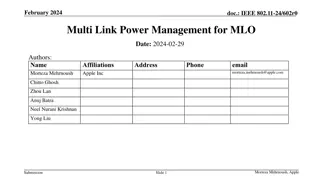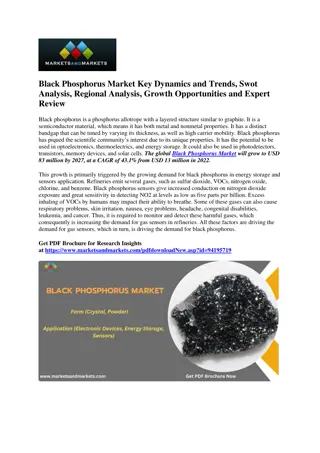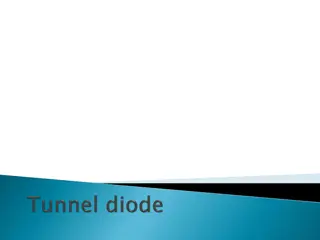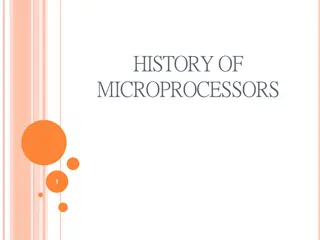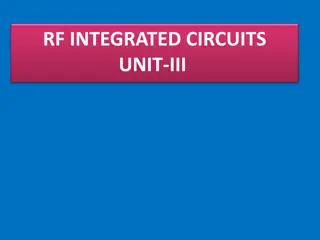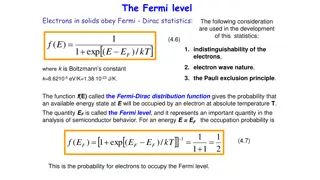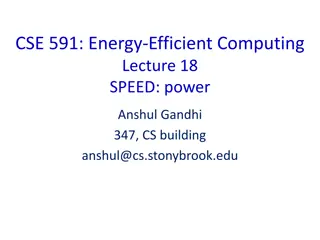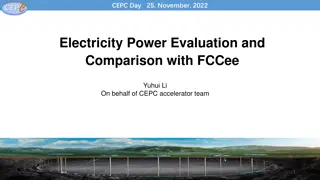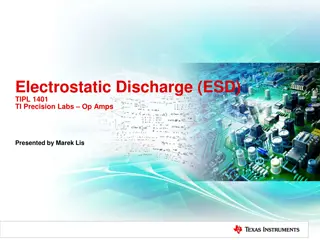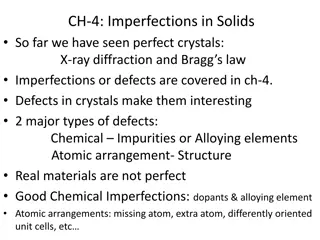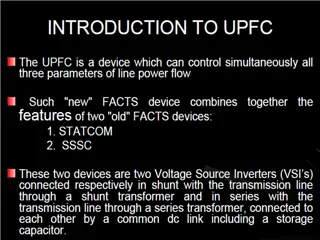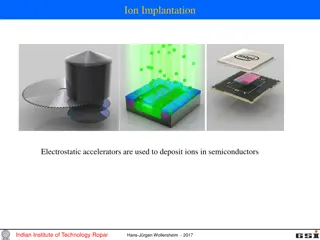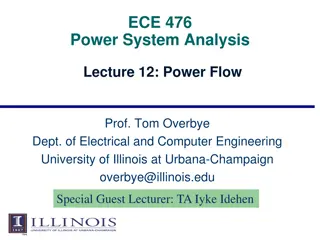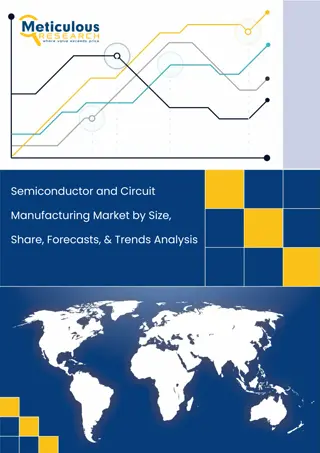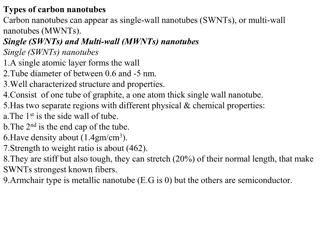X-ray Inspection Systems Market for Electronics & Semiconductors_Blog
The global X-ray Inspection Systems Market for Electronics & Semiconductors is poised for significant growth, projected to hit a value of $772.8 million by 2029, exhibiting a robust Compound Annual Growth Rate (CAGR) of 11% during the forecast period from 2022 to 2029. This surge in market value is
0 views • 2 slides
Understanding Recycled Copper Use in the Circular Economy
Explore the drivers and barriers of recycled copper use in the context of the circular economy. Antitrust guidelines for copper industry trade meetings and insights on scrap copper use are discussed. Cost, ESG pressure, and market dynamics impact the current and future utilization of scrap copper. W
1 views • 4 slides
Cisco Systems Fault Managed Power Portfolio Overview
Cisco Systems offers an industry-leading Fault Managed Power (FMP) patent portfolio comprising 24 active assets across seven INPADOC families. The portfolio includes patents supporting fault-managed power systems, PoE deployments, DC power distribution, DC-DC conversion, and HVDC connectors. The FMP
4 views • 4 slides
ECE 305 Electromagnetic Theory
Explore the fundamental concepts of electric fields in material space, covering topics such as free space, conductors, insulators, semiconductors, current conduction, and charge density. Delve into the properties of materials, convection vs. conduction current, and the role of superconductors in ele
1 views • 25 slides
Improving Multi-Link Power Management Efficiency in IEEE 802.11 Networks
The document discusses challenges with per-link power mode changes in multi-link scenarios in IEEE 802.11 networks, proposing a solution for more efficient power management. It addresses issues such as latency and inefficiencies in signaling for power mode changes, introducing scheduled multi-link p
6 views • 9 slides
Exploring the Role of Polysilicon in Semiconductor and Solar Industries
The article delves into the significance of polysilicon as a vital component in the manufacturing of semiconductors and solar panels. It highlights WACKER's prominent position in the industry and the global production landscape of polysilicon. The discussion extends to the DOE's efforts to enhance r
3 views • 7 slides
Understanding Power Transfer and Impedance Matching in Circuits
Exploring the concept of maximizing power transfer between a source and load through impedance matching. Learn about complex conjugates, real and magnitude of complex numbers, average power in circuits, and the importance of minimizing reflected power. Discover how incident, reflected, and delivered
3 views • 33 slides
North America Leads the Charge in Black Phosphorus Adoption
The black phosphorus market is mainly driven by the increasing demand for gas sensors in critical industries and the implementation of various health and safety regulations globally. The key market players profiled in the report include ACS Material LLC (US), 2D Semiconductors (US), Nanochemazone (
1 views • 3 slides
Impact of COVID-19 on the MRO market for the manufacturing industry
MRO Market for the Manufacturing Industry by Product (Plant Facilities, Automation Equipment, Robots, CNC Equipment), Sector (Consumer Products, Food & Beverage, Automotive, Electronics & Semiconductors) - Global Forecast to 2030\n
0 views • 6 slides
Overview of Semiconductor Materials and Applications
Understanding electronic transport in semiconductors is essential for various applications such as computers, smartphones, LEDs, and more. Semiconductors like silicon and compound semiconductors play a crucial role in creating devices with unique properties. By delving into the world of semiconducti
0 views • 20 slides
Understanding Tunnel Diode: A High-Speed Solid-State Electronic Device
Tunnel diode, a heavily doped solid-state electronic device, displays negative resistance due to the phenomenon of Tunneling. It is utilized as a fast-switching component in computers, with germanium being a common material used to manufacture it. The depletion region's width in a tunnel diode is ex
0 views • 15 slides
Understanding Temperature Effects on Donor and Acceptor Ionization in Semiconductors
Temperature plays a crucial role in the ionization of donor and acceptor atoms in semiconductors. In N-type semiconductors, the Fermi level lies below the conduction band, while in P-type semiconductors it lies above the valence band, with the position depending on temperature and impurity atoms. Do
1 views • 13 slides
Understanding the Impact of Temperature on Fermi Level in Semiconductors
The Fermi level plays a crucial role in determining the behavior of electrons in semiconductors at different temperatures. As temperature increases, the Fermi level shifts, affecting the generation of free electrons and holes in the valence and conduction bands. In intrinsic semiconductors, electron
2 views • 53 slides
Introduction to Uni-Junction Transistor (UJT) in Electronic Semiconductors
Uni-Junction Transistor (UJT) is a semiconductor switching device with unique characteristics, such as regenerative emitter current increase when triggered, leading to a negative resistance region. It finds applications in sawtooth and pulse generation, switching, and triggering SCRs & TRIACs. The U
0 views • 15 slides
Evolution of Microprocessors: A Historical Overview
The history of microprocessors traces back to Fairchild Semiconductors in 1959, leading to the founding of Intel in 1968. The evolution from 4-bit to 64-bit microprocessors by Intel revolutionized computing. Key milestones include the Intel 4004 and 4040 (4-bit), 8008, 8080, and 8085 (8-bit), and th
2 views • 44 slides
Understanding Solar PV Components: Cells, Modules, and Arrays
Solar PV components such as cells, modules, and arrays play a crucial role in converting sunlight into electricity. This unit covers basic terms related to solar PV components, including solar cells, P/N junctions, cell output, various cell constructions, and cell wiring configurations. Explore the
1 views • 15 slides
Understanding Electrochemistry in Engineering Chemistry
Electrochemistry in engineering chemistry explores the interactions between electrical and chemical energy, involving the conversion of energy forms. It discusses electrical conductors, insulators, metallic conductors, good conductors, semiconductors, and electrolytic conductors. The concept of elec
4 views • 56 slides
Understanding Noise in RF Integrated Circuits: Thermal and 1/f Noise
Noise, an unwanted input, limits a system's ability to process weak signals. Sources of noise include random noise in resistors and transistors, mixer noise, undesired cross-coupling noise, and power supply noise. Thermal noise, caused by thermal agitation of charge carriers, is also known as Johnso
1 views • 49 slides
Understanding PN Junction in Semiconductors
Mobility in semiconductors is affected by scattering events as temperature increases, with impurity scattering dominating at low temperatures and lattice scattering at high temperatures. A p-n junction is the interface between p-type and n-type semiconductor materials, with excess holes on the p-sid
0 views • 15 slides
Understanding Conductivity and Current in Extrinsic Semiconductors
This content delves into the intricacies of conductivity in extrinsic semiconductors, exploring the behavior of carriers in n-type and p-type materials. It covers topics such as drift current density, diffusion current density, the Einstein relation, recombination, and the Hall effect. Practical exa
0 views • 8 slides
Understanding Fermi-Dirac Statistics in Solids
Electrons in solids obey Fermi-Dirac statistics, governed by the Fermi-Dirac distribution function. This function describes the probability of electron occupation in available energy states, with the Fermi level representing a crucial parameter in analyzing semiconductor behavior. At different tempe
0 views • 9 slides
Understanding Band Population in Semiconductors
Exploring the concepts of electron and hole population in semiconductor bands through the Fermi-Dirac function, density of states, and Fermi energy. Learn how the Fermi function influences carrier concentration, the difference between metals and semiconductors in band structure, and the behavior of
0 views • 14 slides
Understanding Extrinsic Semiconductors: Fermi Level and Doping Effects
Extrinsic semiconductors play a crucial role in modern electronics by allowing controlled addition of impurities to tailor conductivity. The Fermi level in extrinsic semiconductors shifts based on the number of electrons and holes in the conduction and valence bands, influencing conductivity. Doping
0 views • 14 slides
Understanding Semiconductors: Types, Properties, and Differences
Semiconductors bridge the gap between insulators and conductors, exhibiting varying levels of electrical conductivity based on temperature. This tutorial covers intrinsic semiconductors, differences between silicon and germanium, and the essential properties of semiconductors. Learn about the roles
0 views • 25 slides
Insights into Semiconductor Behavior and Mobility Influence
Understanding the intrinsic and extrinsic behavior of semiconductors with respect to temperature dependence, carrier concentration, and mobility. Exploring the impact of temperature and doping on carrier mobility through lattice and impurity scattering effects. Examining the invariance of Fermi leve
0 views • 8 slides
Understanding Semiconductors: Intrinsic and Extrinsic Types
Semiconductors play a crucial role in electronic devices, with materials falling into three categories based on electric conductivity: Conductors, Insulators, and Semiconductors. Intrinsic semiconductors are chemically pure, while extrinsic semiconductors have impurities added to enhance their condu
0 views • 39 slides
Exploring Power Efficiency in Computing Systems
In this lecture series on energy-efficient computing, various concepts related to dynamic frequency scaling, power capping, power shifting, power modeling, and power measurement are discussed. The impact of power on server speed is explored, alongside strategies for improving performance within powe
0 views • 17 slides
Comparison of Electricity Power Systems Between CEPC and FCCee
The evaluation and comparison of electricity power systems between the CEPC and FCCee accelerators reveal the power breakdowns, RF power consumption, magnet power supply, and overall power usage. Differences in power consumption for various components such as RF, magnets, and vacuum systems are high
0 views • 19 slides
Understanding Electrostatic Discharge (ESD) in Precision Electronics
Explore the world of Electrostatic Discharge (ESD) and how it impacts precision electronics like op-amps and semiconductors. Learn about ESD generation, IC device sensitivity thresholds, ESD damage mechanisms, ESD protection methods, and device ESD robustness testing. Dive into the crucial aspects o
0 views • 33 slides
Understanding Semiconductor Conductivity and Scattering Mechanisms
In the study of semiconductor conductivity, the concept of degenerate and non-degenerate semiconductors is discussed, showcasing the impact of doping levels. The conductivity equation is explored in terms of electron and hole mobilities and densities. The role of scattering mechanisms, such as latti
0 views • 18 slides
Evolution of Materials Science and Engineering in Human History
Explore the journey of materials in human history, from traditional ceramics to high-tech metal industry and beyond. Learn about the development of materials science and engineering, the different properties of materials, and the classification of materials into metals, ceramics, polymers, composite
0 views • 9 slides
Understanding Imperfections in Solids
Imperfections or defects in crystals introduce intriguing properties to materials. This chapter explores two major types of defects - chemical impurities/alloying elements and atomic arrangement anomalies. Imperfections play vital roles in altering material properties, such as in semiconductors and
0 views • 18 slides
Overview of Unified Power Flow Controller (UPFC) in Power Systems
A Unified Power Flow Controller (UPFC) is a combination of a Static Synchronous Compensator (STATCOM) and a Static Synchronous Series Compensator (SSSC) interconnected via a common DC link. UPFC allows bidirectional flow of real power and provides concurrent real and reactive series line compensatio
0 views • 20 slides
Understanding Leadership and Power Dynamics
Power and leadership are interconnected concepts, with power being the measure of a person's ability to influence others. Leaders have power in various situations, but it does not necessarily mean having power over people. Effective leaders balance their use of power with knowledge and trust, knowin
0 views • 9 slides
Applications of Ion Implantation and Electron Beam Processing in Various Industries
Ion implantation and electron beam processing play crucial roles in industries such as semiconductor manufacturing, food preservation, surface hardening, waste treatment, and gemstone color modification. These processes involve the use of accelerators to deposit ions or generate electron beams for p
0 views • 20 slides
Power System Analysis: Lecture on Power Flow
Lecture 12 on Power Flow Analysis in Power Systems covers the use of power balance equations when analyzing complex power consumption and generation. It explains the derivation of real power balance equations for iterative solutions in power flow analysis. The lecture highlights the need for iterati
0 views • 30 slides
Energy Level Formation in Semiconductor Materials
Energy levels in isolated atomic structures form discrete levels which expand to bands in insulators, semiconductors, and conductors. Extrinsic materials like n-type and p-type are created by doping semiconductors with impurity atoms to alter conductivity. The n-type material involves adding pentava
0 views • 4 slides
Understanding Nonlinear Optical Processes in Semiconductors
Exploring the complexities of nonlinear optics in the perturbative and non-perturbative regimes, this research delves into the generation of harmonics, optical Kerr effects, and extreme nonlinear optical phenomena utilizing phase-controlled electromagnetic pulses. The work also investigates the inte
0 views • 15 slides
semi conductour
The growth of the semiconductor and circuit manufacturing market is attributed to the rising acceptance of connected devices, increasing government initiatives aimed at boosting the semiconductor industry, and increasing utilization of semiconductors
1 views • 4 slides
Understanding Different Types of Carbon Nanotubes
Carbon nanotubes come in single-wall (SWNTs) and multi-wall (MWNTs) forms, each with unique characteristics. SWNTs have a single atomic layer forming the wall, while MWNTs consist of concentric tubes. SWNTs are stronger and mostly semiconductors, while MWNTs are less strong and can also be semicondu
0 views • 10 slides



